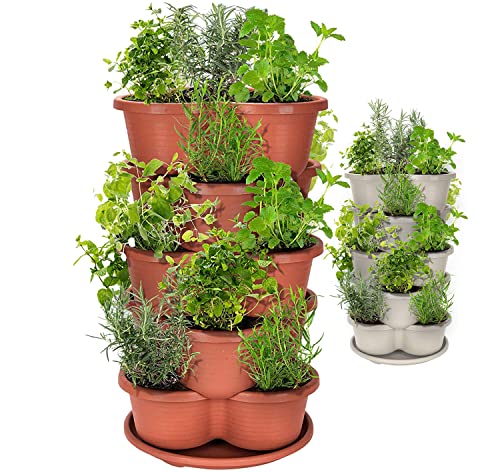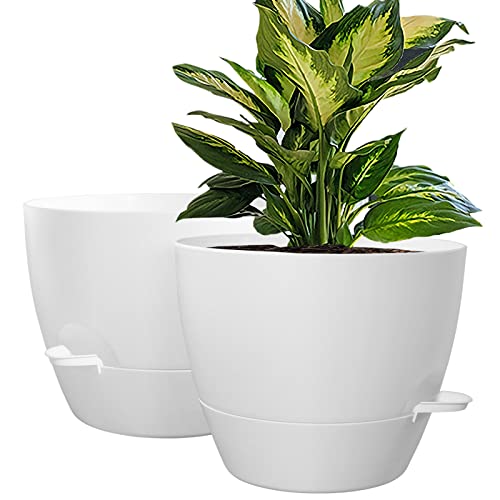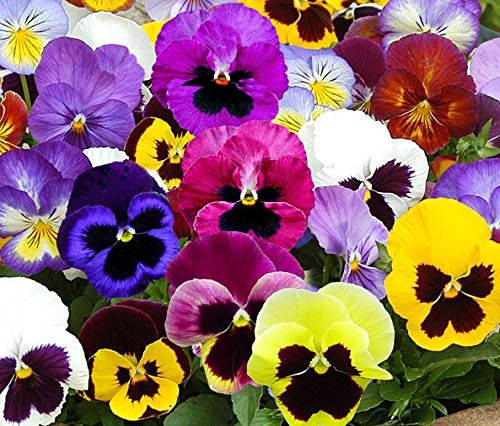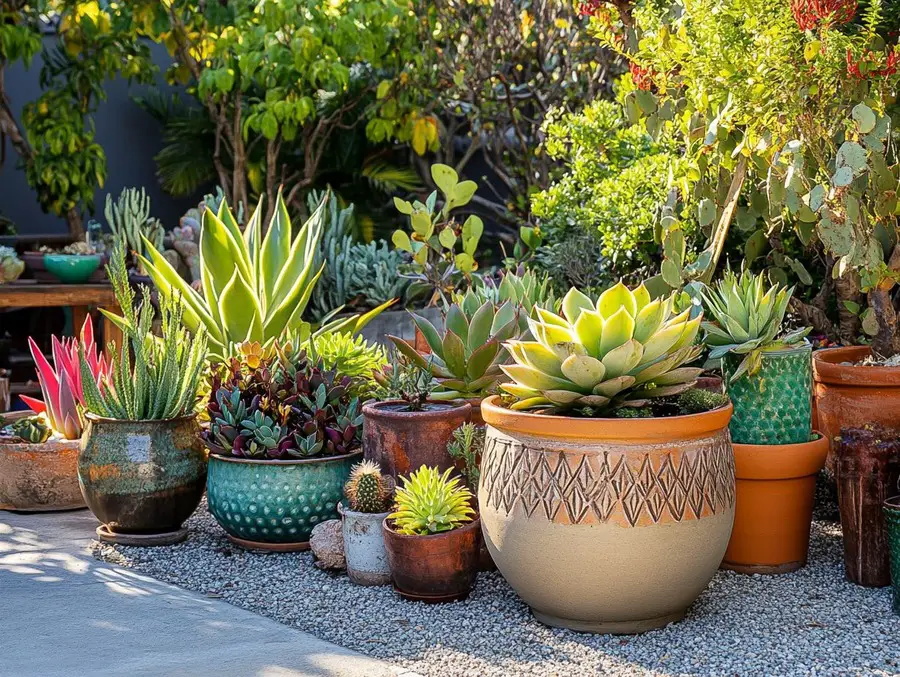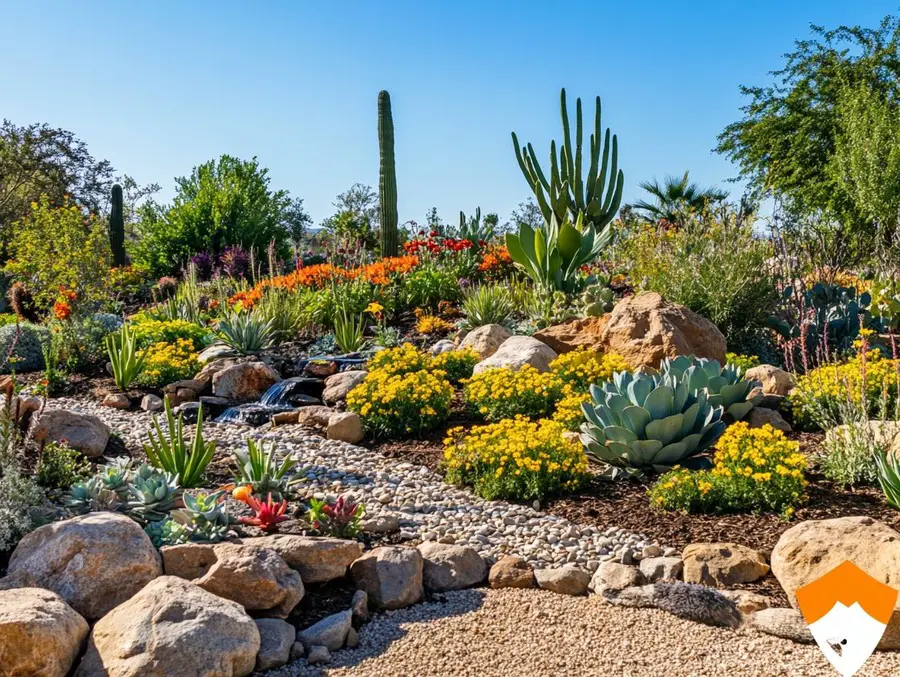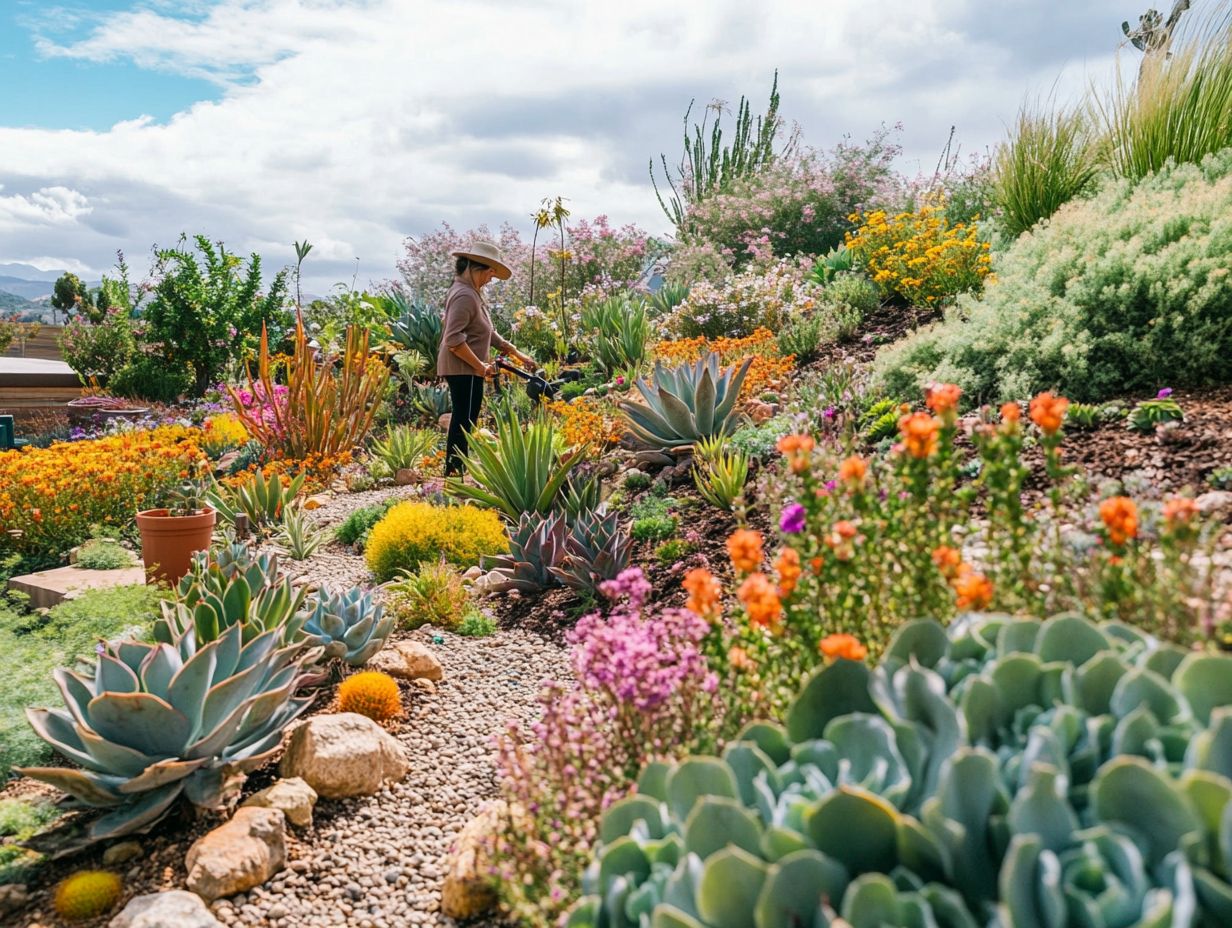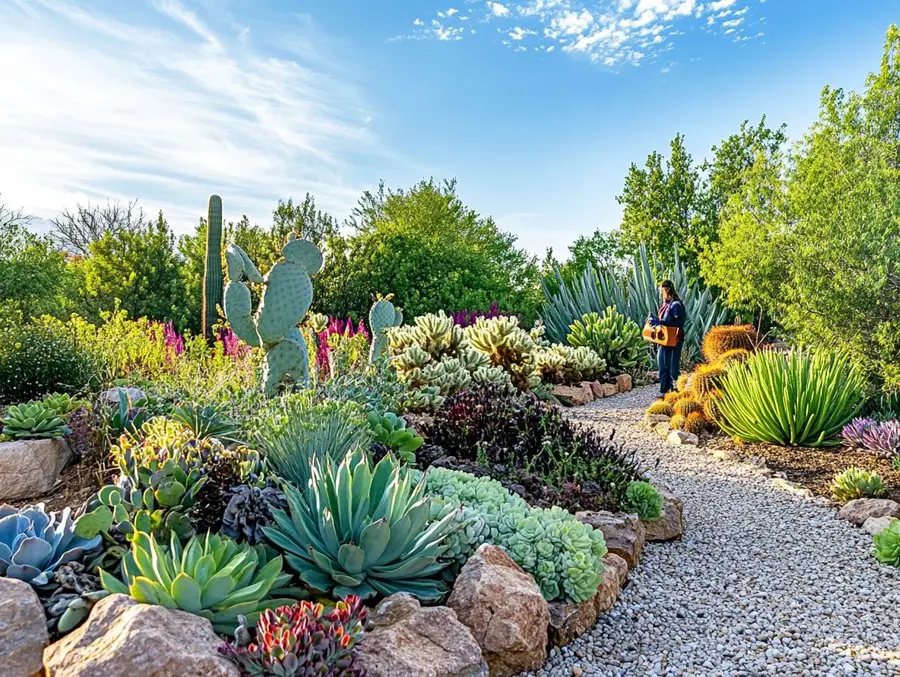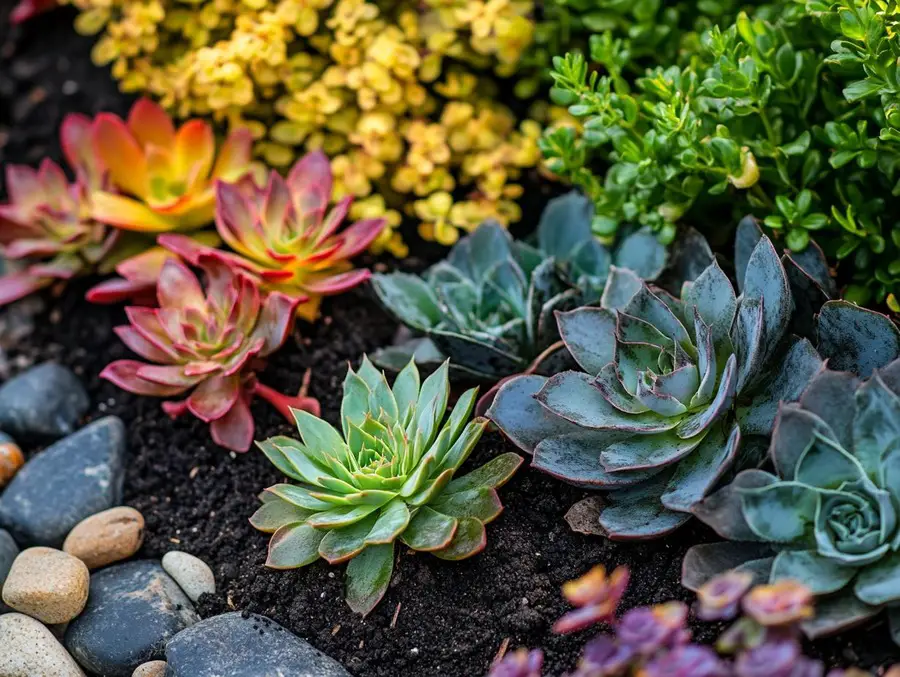We use affiliate links. If you purchase something using one of these links, we may receive compensation or commission.
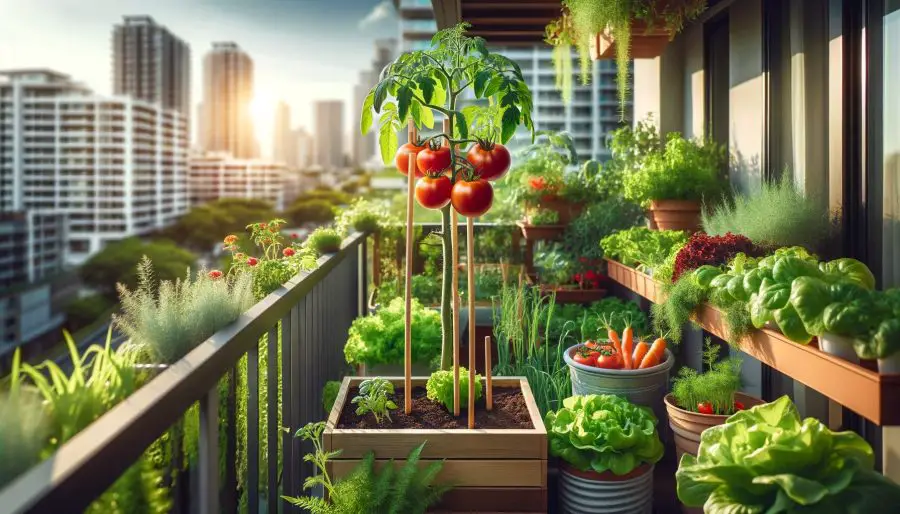
Discover the joys of an organic balcony vegetable garden! Embrace urban sustainability with fresh, homegrown veggies and herbs right at your doorstep.
Organic Balcony Vegetable Garden
Key Takeaways:
- An Organic Balcony Vegetable Garden is a sustainable method of growing fresh produce in limited urban spaces.
- It involves using natural, chemical-free techniques to cultivate vegetables, fruits, and herbs on a balcony or terrace.
- It offers a practical solution for city dwellers to engage in gardening and enjoy homegrown, organic food.
Welcome to the green world of an organic balcony vegetable garden!
Whether you’re a seasoned green thumb or just starting out, this guide will help you transform your balcony into a lush, productive space.
Get ready to grow fresh, healthy produce in the comfort of your own urban oasis.
Starting an Organic Balcony Vegetable Garden
In this comprehensive guide, we will explore the world of organic balcony vegetable gardening.
Whether you have a small urban balcony or a spacious terrace, this article will provide you with the essential knowledge and practical tips to grow your own fresh and healthy produce right outside your door.
From choosing the right location and planters to selecting the best soil, fertilizers, and seeds, we’ll cover every aspect of creating a thriving balcony garden.
We’ll also delve into recommended plants, irrigation methods, container selection, and organic fertilizing techniques.
We’ll discuss pest control, maintenance, and harvesting, and provide key takeaways to ensure a successful and bountiful balcony garden.
This guide will equip you with the tools and knowledge to cultivate a flourishing organic balcony vegetable garden.
Key Takeaways:
- Organic balcony vegetable gardening is a great way to grow fresh produce in a small space.
- Choosing the right planters, soil, and fertilizer is crucial for successful balcony gardening.
- Utilizing organic fertilizing methods and pest control can help maintain a healthy and sustainable balcony vegetable garden.
Organic Balcony Vegetable Gardening Guide
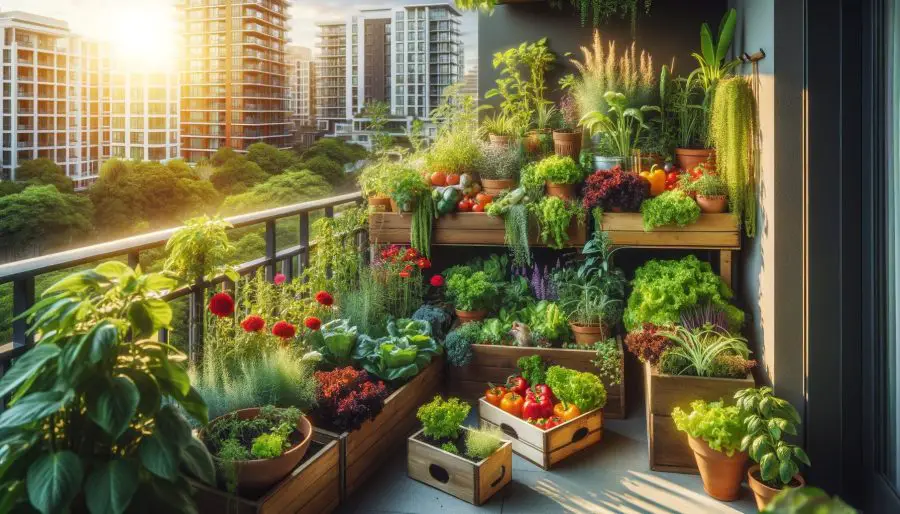
Organic balcony vegetable gardening is an enjoyable and rewarding way to grow your own fresh produce in a limited space, ensuring access to organic, homegrown vegetables and herbs right at your doorstep.
Container gardening is a versatile method that allows individuals to cultivate a variety of vegetables, fruits, and herbs in small spaces, making it an ideal option for balconies.
Using organic soil or coconut coir and fertilizer is essential for maintaining a healthy and chemical-free environment, ensuring the production of nutritious and flavorful produce.
When selecting the location for your balcony garden, consider the amount of sunlight and drainage available to optimize the growing conditions.
Popular options for balcony-friendly plants include tomatoes, peppers, lettuce, and herbs like basil and cilantro.
It’s important to choose seeds or seedlings that are well-suited to container gardening to ensure a successful harvest.
Location and Space Considerations
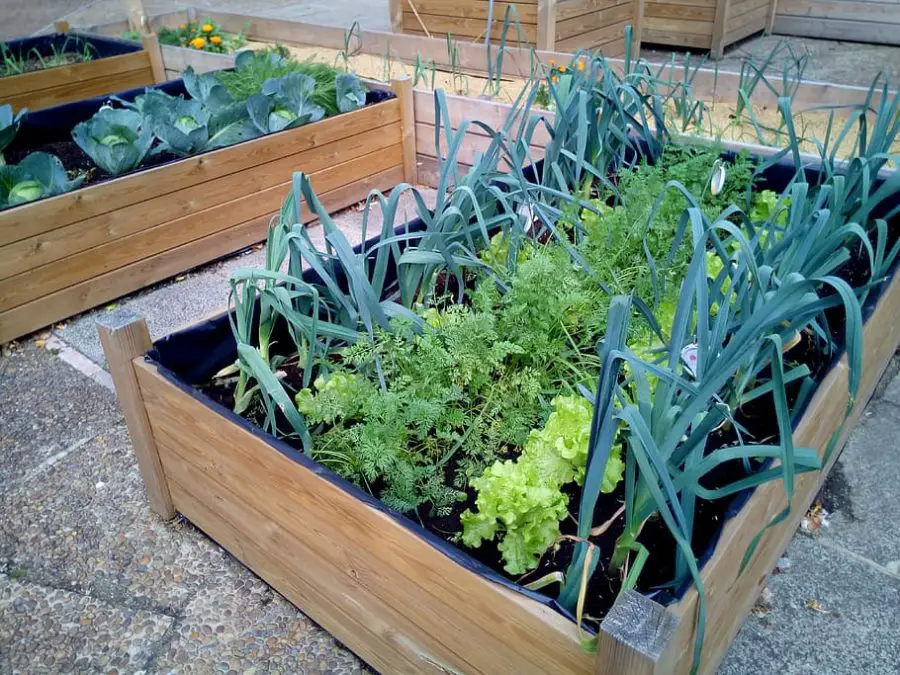
Selecting the right location and optimizing space are crucial for successful organic balcony vegetable gardening, ensuring that the plants receive adequate sunlight, water, and a suitable environment for healthy growth.
When choosing a location for balcony gardening, it’s important to assess the sunlight exposure.
South-facing balconies generally receive the most sunlight throughout the day, making them ideal for sun-loving vegetables.
Consider the accessibility to water sources. Balconies with easy access to water make watering the plants more convenient.
The balcony environment can impact the temperature and wind patterns, affecting plant growth.
It’s essential to shield plants from strong winds and provide proper ventilation to prevent heat buildup.
In terms of space constraints, utilizing appropriate pots and containers is essential.
Choosing the right potting mix and organic soil is crucial for ensuring optimal plant growth in a limited space while promoting sustainability.
Vertical Gardening: Maximizing Small Spaces
Introduction to Vertical Gardening
Vertical gardening is a revolutionary approach that maximizes the use of small spaces for growing plants.
This method is particularly beneficial for urban dwellers with limited ground space, like those with small balconies, patios, or tiny backyards.
By growing upwards instead of outwards, vertical gardening allows you to cultivate a diverse range of plants, from flowers and herbs to vegetables and fruits, in a compact area.
This innovative technique not only optimizes limited spaces but also adds an aesthetic appeal to your urban abode.
Benefits of Vertical Gardening
- Space Efficiency: The most significant advantage of vertical gardening is its space-saving nature. It’s ideal for apartment balconies or small yards where ground space is scarce.
- Improved Accessibility: Tending to a vertical garden is often easier on the back and knees, making gardening more accessible for everyone, including those with mobility issues.
- Enhanced Plant Health: Elevating plants off the ground can reduce the risk of soil-borne diseases and minimize pest infestations, leading to healthier plants.
- Aesthetic Appeal: Vertical gardens can transform a bland wall or fence into a vibrant, living artwork, enhancing the overall ambiance of your space.
Starting Your Vertical Garden
- Choose the Right Structure: Options include trellises, hanging baskets, wall planters, and tiered shelves. Ensure the structure is sturdy and suitable for the type of plants you want to grow.
- Select Suitable Plants: Ideal plants for vertical gardening include trailing species like ivy, food-producing plants like tomatoes and strawberries, and decorative flowers. Consider the sunlight and watering needs of your chosen plants.
- Soil and Watering: Use a high-quality potting mix for better aeration and drainage. Vertical gardens may dry out faster than traditional gardens, so consider a drip irrigation system or self-watering planters to maintain consistent moisture.
- Location: Position your vertical garden in a spot that receives adequate sunlight based on the needs of your plants. Some vertical gardens can be mounted on wheels for easy movement.
Design Tips for Vertical Gardening
- Mix and Match: Combine plants with different textures, colors, and growth patterns for a visually appealing display.
- Utilize Companion Planting: Pair plants that benefit each other – for example, marigolds can help deter pests from neighboring vegetables.
- Seasonal Changes: Rotate plants according to the season to keep your vertical garden vibrant all year round.
- Incorporate Edibles: Blend in herbs and vegetables with ornamental plants for a functional yet beautiful garden.
Maintenance and Care
- Regular Watering: Vertical gardens may require more frequent watering. Check the soil moisture regularly.
- Pruning and Deadheading: Regularly prune and deadhead to maintain the shape and health of your plants.
- Fertilization: Use organic fertilizers to nourish your plants. Be mindful of the nutrient needs specific to the plants in your garden.
- Pest and Disease Management: Monitor for pests and diseases. Use organic methods to treat any issues promptly.
Vertical Gardening in a Nutshell
- Vertical gardening is an innovative and efficient way to enjoy gardening in small spaces.
- It offers numerous benefits, from aesthetic enhancement to improved plant health.
- With proper planning, selection, and care, your vertical garden can be a lush, productive, and beautiful addition to your urban living space, providing a touch of nature’s serenity amidst the city hustle.
Choosing the Right Planters for Balcony Gardening
Selecting the right planters is essential for balcony gardening, as it directly impacts the growth and well-being of the plants, ensuring proper drainage, aeration, and space optimization for healthy root development and plant growth.
Self-watering planters can take the guesswork out of watering. They use capillary action to evenly water plants.
When choosing planters for balcony gardening, considering the drainage system is crucial, as excess water can lead to root rot and other plant diseases.
It’s best to opt for planters with drainage holes or trays to allow the water to escape.
Proper aeration is vital, which can be facilitated through planters with breathable materials like fabric pots, promoting air circulation around the roots.
Space optimization is another key factor to note. Planters should provide adequate room for root growth while fitting well within the balcony space.
Ensuring that the chosen planters are of the right size prevents overcrowding, promoting healthier plants.
An important aspect of successful balcony gardening is employing organic soil and potting mix in the planters.
These foster a naturally sustainable environment for the plants, free from harmful chemicals, fostering healthy and thriving growth.
Soil and Fertilizer Selection
Selecting the right soil and fertilizer is crucial for organic balcony vegetable gardening, as it directly impacts the nutrient availability and overall health of the plants, supporting organic growth and sustainability.
Organic soil and fertilizer play a vital role in providing a healthy environment for balcony gardening. Worm castings make a great organic fertilizer.
Proper drainage is essential to prevent waterlogging, ensuring the roots receive the required oxygen.
Furthermore, water retention is essential to maintain moisture levels for the plants.
I prefer using Canna coco coir and perlite as a growing medium for the above reasons
But Organic options such as FoxFarm Ocean Forest Potting Soil Mix and Espoma Organic Potting Soil Mix offer a rich blend of natural ingredients, providing nutrients for sustained plant growth.
Incorporating compost into the soil enriches it with valuable nutrients, promoting a thriving ecosystem for the vegetables.
Seed Selection and Starting Seedlings
Careful seed selection and proper seedling management are critical steps in organic balcony vegetable gardening, ensuring the growth of healthy, robust plants that are well-suited to the balcony environment.
When starting the process, it’s essential to choose organic seeds that are free from synthetic pesticides and chemicals, as they promote the long-term health of the plants and the ecosystem.
Once you have selected these non-gmo seeds, prepare a suitable soil mixture that is well-draining and rich in nutrients, ensuring healthy growth.
It is also important to provide sufficient water and sunlight for the seedlings, as well as regular application of organic compost to promote their development.
Planting Guide for Balcony Vegetable Garden
A comprehensive planting guide is essential for the success of a balcony vegetable garden, covering aspects such as plant selection, spacing, and maintenance practices tailored to the unique conditions of balcony gardening.
When selecting plants for a balcony garden, consider the sunlight exposure and the space availability.
Vegetables such as tomatoes, peppers, and herbs like basil and parsley thrive in containers.
Ensuring proper spacing between plants is crucial to avoid overcrowding and promoting healthy growth.
It’s important to use organic soil to provide essential nutrients and establish a watering schedule that accommodates the reduced drainage typical of balcony environments.
Recommended Vegetable and Herb Plants for Balcony Gardening
Introduction to Plant Selection
Choosing the right plants is crucial for a thriving balcony garden. Not all vegetables and herbs can adapt to the confined space of a balcony, but many thrive in this environment.
This section will guide you through selecting the most suitable and rewarding plants for your balcony garden.
Top Vegetables for Balcony Gardens
- Tomatoes: A balcony favorite, tomatoes need ample sunlight and a bit of space. Choose dwarf or cherry tomato varieties for the best results.
- Peppers: Both sweet and hot pepper varieties do well in pots. They require similar conditions as tomatoes, making them great companions.
- Lettuce and Leafy Greens: These are perfect for balcony gardens due to their compact growth habit and quick harvesting cycle. They prefer cooler temperatures and partial shade.
- Radishes: Radishes are easy to grow and mature quickly, making them ideal for beginners. They require little space and can be grown in shallow containers.
- Carrots: While they need deeper pots for root development, carrots are a rewarding choice for balcony gardens, especially smaller, round varieties.
Favorite Herbs for Balcony Gardening
- Basil: A must-have for any balcony garden, basil loves the sun and grows well in containers. It’s perfect for adding fresh flavor to dishes.
- Mint: Mint is easy to grow but can be invasive, so it’s best kept in its own pot. It thrives in both sun and partial shade.
- Cilantro: Ideal for cooler weather, cilantro grows quickly and is great for small spaces. It does require regular watering.
- Parsley: Parsley, both curly and flat-leaf, is versatile and grows well in moderate conditions. It’s a hardy herb suitable for balcony environments.
- Chives: Chives are a great addition to a balcony garden, requiring minimal care and offering a mild onion flavor for culinary uses.
Tips for Growing Vegetables and Herbs on Balconies
- Pot Size and Soil: Ensure you use pots that are large enough for your plants’ roots and fill them with high-quality potting soil.
- Watering: Balcony plants may dry out faster, especially in the summer, so regular watering is essential.
- Sunlight: Most vegetables and herbs need at least 6 hours of sunlight per day. Position your plants accordingly.
- Fertilization: Use organic fertilizers to provide your plants with the necessary nutrients without harming the environment.
In a Nutshell
Growing vegetables and herbs on a balcony is not only rewarding but also adds a fresh, green touch to urban living.
The key to a successful balcony garden lies in choosing the right plants and providing them with the appropriate care.
With these recommended vegetables and herbs, you can enjoy a variety of fresh, homegrown flavors right from your balcony.
Recommended Flowering Plants for Balcony Gardening
Plants such as Nasturtium, Petunia, and Salvia, ensuring a diverse and thriving organic balcony garden.
These plants are ideal choices for container gardening due to their adaptability to smaller spaces and ability to thrive in pots or hanging baskets.
Nasturtium, known for its vibrant flowers and peppery leaves, is an excellent addition to any balcony garden.
It thrives in well-draining, organic soil and can be easily grown in both sunny and partially shaded balcony locations.
Petunias, with their beautiful blooms in various colors, are perfect for balcony containers.
They require regular watering and prefer a sunny spot, making them a delightful addition to any balcony garden. Organic soil rich in nutrients is vital for their growth.
Salvia, known for its aromatic foliage and attractive flowers, is a versatile herb that can be grown in containers.
It prefers well-drained soil and a sunny location, encouraging healthy growth and vibrant blooms. This herb also attracts pollinators, adding ecological benefits to the balcony garden.
When choosing flowering plants for a balcony garden, it’s essential to consider their compatibility with organic soil and water management.
To enhance their growth, consider using planters that provide adequate drainage, allowing the soil to remain moist but not waterlogged.
Look for planters that are made from sustainable materials, such as recycled plastic or biodegradable composites, to align with the organic gardening principles.
Incorporating a mix of flowering plants can attract beneficial insects, contributing to the ecological balance of the balcony garden.
Irrigation Methods for Balcony Vegetable Garden
Implementing effective and sustainable irrigation methods is crucial for maintaining the health and vitality of plants in a balcony vegetable garden, ensuring proper water distribution and conservation suited to the balcony environment.
Balcony gardening presents unique challenges for irrigation due to limited space and exposure to different environmental factors.
Utilizing drip irrigation systems with adjustable nozzles can offer precise and efficient water delivery, minimizing water wastage.
Self-watering planters with reservoirs help maintain consistent moisture levels, reducing the need for frequent watering.
It’s important to consider using organic water management practices, such as collecting and reusing rainwater or implementing a smart irrigation system to conserve water and promote sustainability in balcony gardening.
Container and Potting Mix Selection
Selecting the right containers and potting mix is essential for organic balcony gardening, as it directly impacts the soil quality, drainage, and aeration necessary for healthy plant growth and development.
In terms of potting mix, organic soil is the preferred option for its ability to promote soil structure, microbial activity, and nutrient availability. It fosters a balanced ecosystem for plants, supporting their overall health and vitality in the confined space of containers.
Microbial Inoculants for Organic Balcony Gardening
Incorporating microbial inoculants into the organic gardening process can enhance soil fertility and promote plant health, introducing beneficial microorganisms that contribute to nutrient uptake and disease resistance in the balcony environment.
Microbial inoculants play a crucial role in organic balcony gardening by enriching the soil with beneficial bacteria and fungi.
They help in breaking down organic matter, releasing essential nutrients, and improving soil structure, thus creating an optimal environment for plant growth.
By enhancing soil fertility and nutrient availability, microbial inoculants support the overall health and vigor of plants, ultimately contributing to sustainable and organic gardening practices on balconies.
Organic Fertilizing Methods for Container Plants
Utilizing organic fertilizing methods is essential for nourishing container plants in a balcony gardening setup, providing essential nutrients and promoting sustainable growth without compromising the organic integrity of the garden.
Organic fertilizers are particularly beneficial in this context, as they offer a natural approach to feeding plants, ensuring that they receive the necessary nutrients without introducing harmful chemicals.
By implementing these organic fertilizing methods, gardeners can support the health and vitality of their container plants, contributing to a more sustainable and environmentally friendly approach to gardening, especially in urban settings with limited space.
Pest Control and Maintenance
Implementing effective pest control and regular maintenance practices is crucial for preserving the health and vitality of plants in a balcony vegetable garden, ensuring organic and sustainable cultivation methods.
In terms of managing common pests, it’s essential to stay vigilant and proactive.
Any sign of infestation should be addressed promptly to prevent it from spreading and causing significant damage to your precious plants.
Embracing organic pest control methods, such as insecticidal soaps or neem oil, using natural predators, creating physical barriers, or introducing companion plants, can help maintain a healthy balance in the garden ecosystem without relying on harmful chemicals.
Incorporating regular maintenance tasks into your gardening routine, such as weeding, pruning, and monitoring plant health, is a proactive approach to prevent pest issues and maintain the overall well-being of your balcony garden.
Regularly inspecting plants for signs of disease or pest damage and promptly addressing any issues can significantly contribute to the success of your vegetable cultivation efforts.
Harvesting Tips for Balcony Vegetable Garden
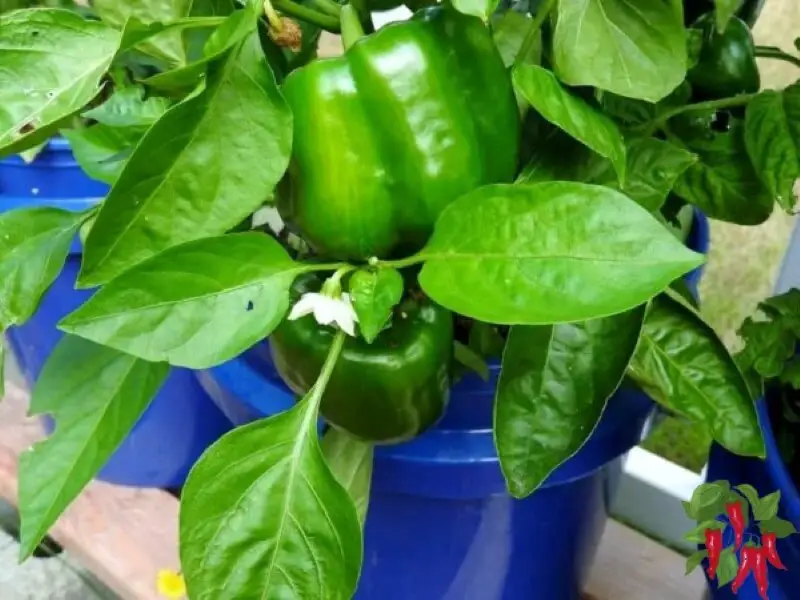
Harvesting fresh produce from a balcony vegetable garden is a rewarding culmination of the gardening process, offering organic and homegrown fruits, vegetables, and herbs for culinary enjoyment and sustainability.
In terms of harvesting from a balcony garden, timing is crucial. It’s essential to pick fruits and vegetables when they are ripe to ensure the best flavor and nutritional value.
Consider investing in a small harvest basket or containers to collect your bounty.
To maintain the organic and sustainable nature of your harvest, avoid using chemical pesticides or fertilizers. Instead, opt for natural pest control methods and organic fertilizers to promote healthy growth.
The gratification of utilizing produce you’ve grown yourself, knowing that it’s free from harmful chemicals, is unparalleled.
It’s not just about the delicious flavors; it’s also about the satisfaction of being in control of what goes into your body.
Organic Balcony Vegetable Garden FAQs
Q. What is an organic balcony vegetable garden?
A. An organic balcony vegetable garden is a small, sustainable garden that is grown using only natural and chemical-free methods on a balcony or small outdoor space.
Q. Why should I start an organic balcony vegetable garden?
A. Organic balcony vegetable gardens allow you to have access to fresh, healthy produce right at your fingertips. It also promotes sustainability and is a great way to reduce your carbon footprint.
Q. What are the benefits of growing vegetables in a balcony garden?
A. Some benefits of growing vegetables in a balcony garden include saving money on groceries, having control over the growing process, and enjoying the satisfaction of growing your own food.
Q. What vegetables are suitable for growing in an organic balcony garden?
A. Many vegetables are suitable for growing in an organic balcony garden, including leafy greens, herbs, tomatoes, peppers, and root vegetables like carrots and radishes.
Q. Do I need any special equipment to start an organic balcony vegetable garden?
A. No, you do not need any special equipment to start an organic balcony vegetable garden. Basic gardening tools, containers, and potting soil are all you need to get started.
Q. How do I maintain an organic balcony vegetable garden?
A. To maintain an organic balcony vegetable garden, you should regularly water your plants, provide them with enough sunlight, and use organic fertilizers or compost to nourish the soil. You should also regularly check for pests and take preventative measures if necessary.
Organic Balcony Vegetable Gardening: Conclusion
In this comprehensive guide, we’ve delved into the enriching practice of organic balcony vegetable gardening, emphasizing how vertical gardening techniques can enhance this experience.
This fusion creates an efficient, eco-friendly, and aesthetically pleasing approach to urban gardening, maximizing limited space while nurturing a connection with nature.
Learn more: Balcony Gardening: Comprehensive Guide
Enhancing Organic Balcony Gardens
- Space-Saving Solutions: Vertical gardening methods complement balcony gardens, optimizing available space.
- Aesthetic and Practical: Transforming vertical spaces into lush, productive areas.
Health and Sustainability
- Accessibility and Ease: Vertical gardening in balcony spaces is back-friendly and efficient.
- Healthy Plants, Healthy Environment: Elevated gardens help prevent plant diseases and foster organic growth.
A Greener Urban Lifestyle
- Eco-Friendly Gardening: Both practices support sustainable living in urban settings.
- Biodiversity in the City: Attracting beneficial insects and pollinators, enhancing ecological balance.
Final Thoughts and Key Takeaways
In conclusion, organic balcony vegetable gardening is a fulfilling and sustainable activity that enables individuals to cultivate their own organic produce, fostering a connection with nature and promoting a healthier lifestyle in urban settings.
By choosing organic methods for balcony vegetable gardening, individuals contribute to the promotion of sustainable agriculture and support the environmental health of their surroundings.
This practice not only ensures the availability of fresh, chemical-free produce but also encourages a deeper appreciation for natural processes, ultimately leading to a greater sense of fulfillment and contentment.
The act of nurturing plants in limited urban spaces allows people to experience the joy of growing their own food and play a part in the broader movement towards a healthier, more eco-friendly lifestyle.
Organic balcony vegetable gardening, augmented with vertical gardening techniques, offers more than just the joy of growing your own food.
It’s a step towards sustainable urban living. This approach not only maximizes limited urban spaces but also brings the beauty and tranquility of nature to our everyday environments.
It’s a testament to how, even in the smallest of spaces, we can make significant contributions to both our well-being and the health of our planet.
Related Content
Visit my Amazon Influencer Page for videos and gardening products Grow Your Own Garden


